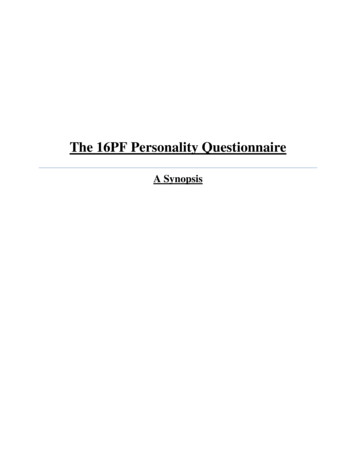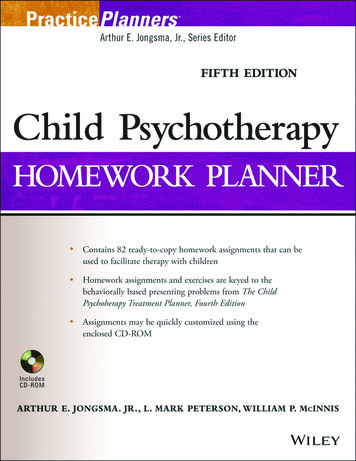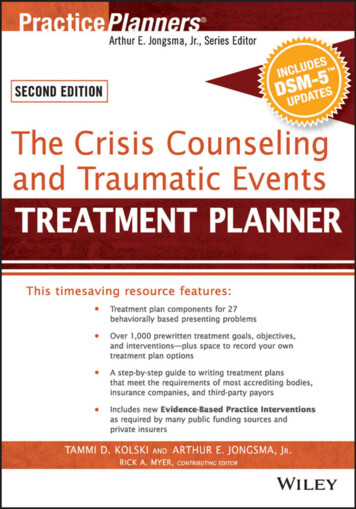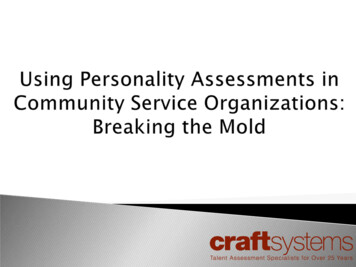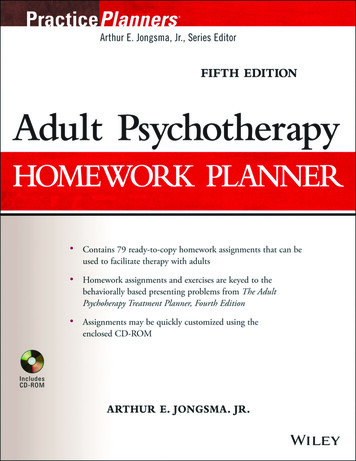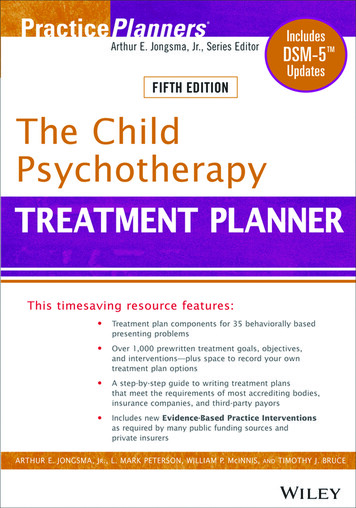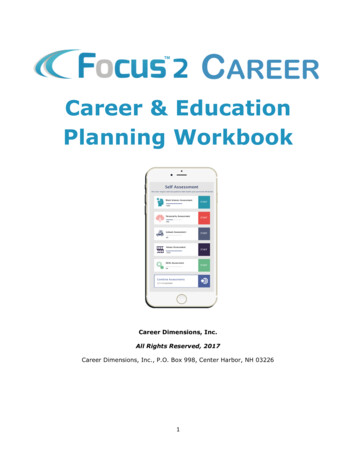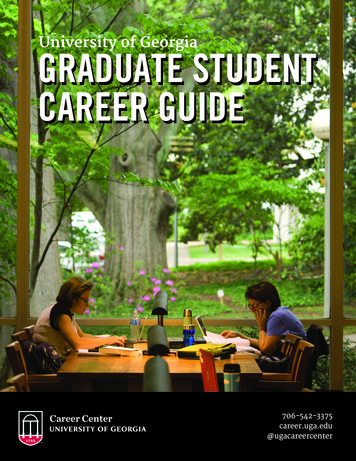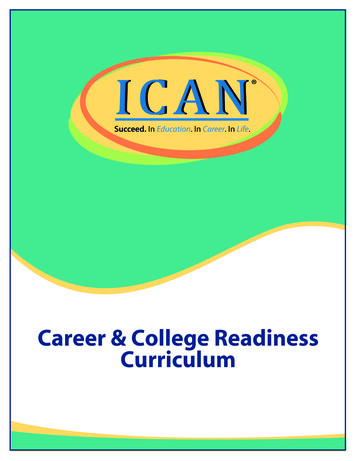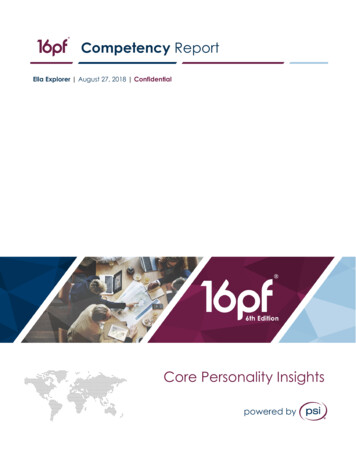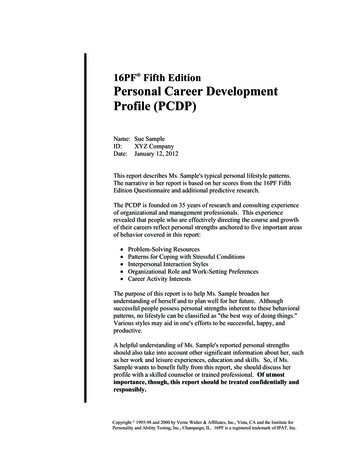
Transcription
16PF Fifth EditionPersonal Career DevelopmentProfile (PCDP)Name: Sue SampleID:XYZ CompanyDate: January 12, 2012This report describes Ms. Sample's typical personal lifestyle patterns.The narrative in her report is based on her scores from the 16PF FifthEdition Questionnaire and additional predictive research.The PCDP is founded on 35 years of research and consulting experienceof organizational and management professionals. This experiencerevealed that people who are effectively directing the course and growthof their careers reflect personal strengths anchored to five important areasof behavior covered in this report: Problem-Solving ResourcesPatterns for Coping with Stressful ConditionsInterpersonal Interaction StylesOrganizational Role and Work-Setting PreferencesCareer Activity InterestsThe purpose of this report is to help Ms. Sample broaden herunderstanding of herself and to plan well for her future. Althoughsuccessful people possess personal strengths inherent to these behavioralpatterns, no lifestyle can be classified as "the best way of doing things."Various styles may aid in one's efforts to be successful, happy, andproductive.A helpful understanding of Ms. Sample's reported personal strengthsshould also take into account other significant information about her, suchas her work and leisure experiences, education and skills. So, if Ms.Sample wants to benefit fully from this report, she should discuss herprofile with a skilled counselor or trained professional. Of utmostimportance, though, this report should be treated confidentially andresponsibly.Copyright 1995-98 and 2000 by Verne Walter & Affiliates, Inc., Vista, CA and the Institute forPersonality and Ability Testing, Inc., Champaign, IL. 16PF is a registered trademark of IPAT, Inc.
Personal Career Development ProfileSue SampleJanaury 12, 2012PROBLEM-SOLVING RESOURCESThis section describes Ms. Sample's unique problem-solving resources: What are her overallstrengths for solving most problems? How does she usually approach resolving problemswhich confront her?Ms. Sample is more at ease working on problems of a practical nature than those that require aquick grasp of abstract concepts and relationships. She works best when she can take enoughtime to think about the issues involved and is able to understand their meaning. She learns bestby doing from practical, first-hand experience. She also prefers short-term training to achieve aspecific goal or skill. She is usually most comfortable working on problems that relate directly toher base of experience and training.Ms. Sample generally reacts rather matter-of-factly and impersonally to most problems andsituations. She is alert and ready to take on most projects. But in some instances, she maybecome so focused on issues that appear obvious and practical to her, that she may overlook theimpact of her actions on others involved with her. Ms. Sample seems to place important value ontaking what she believes is a practical and useful approach to most problems and situations. Sheseldom tends to permit her emotions, feelings or intuitions to play a major role in what she strivesto accomplish. However, she may run the risk that people who are more sensitive may view heras unbending at times. She normally believes she has control over most of the decisions shemakes. Ms. Sample tends to be a rather cautious person who relies rather heavily on tried-andtrue methods when working on problem situations of importance. She is inclined to placeconfidence in what she has learned. She is generally supportive of established beliefs and waysof doing things. Ms. Sample normally tries to take a practical and down-to-earth approach whenworking through everyday problems. Ms. Sample usually strives to stick mostly to practical andrealistic ways of doing things as she deals with life and its problems. She usually pays attentionto the everyday aspects and requirements of situations.PATTERNS FOR COPING WITH STRESSFUL CONDITIONSThe personal patterns Ms. Sample presently reflects in efforts to cope with stress and pressurein life are described in this section: Depending on the situation, how does she tend to react toemotionally charged events? What is she likely to do when faced with conflict or opposition onthe part of others?For the most part, Ms. Sample seems to be well-adjusted. She does not usually show signs oftension and worry. She usually strives to take most situations in stride and to manage them in abalanced and adaptive way. She rarely allows her emotional reactions to get in the way of whatshe does or tries to do in situations and relationships. She feels strongly about her reputation andher concerns about how things should be done. She tends, therefore, to act in ways that fit herbeliefs about the need for orderliness and having things "just so." At the present time, shepresents herself as a person who is relaxed and composed. She does not seem to be worried orfrustrated. As a result, she probably does not really wish to change herself in any major way.She may come across to some people, though, as being too complacent and self-accepting.INTERPERSONAL INTERACTION STYLES2
Personal Career Development ProfileSue SampleJanuary 12, 2012This section covers Ms. Sample's styles for relating and communicating with others: How doesMs. Sample usually react in dealing with others? What are her major sources of gratificationand satisfaction when building relationships with others?Most of the time, Ms. Sample tends to pay rather close attention to people around her. Sheseldom spends a lot of effort and time focusing on herself. She is a socially participative personfor the most part. Ms. Sample is generally quite at ease when approaching and talking withpeople in most social gatherings. Ms. Sample is usually quite forward when meeting and talkingwith others. Nevertheless, she appears to relate to most people with ease and comfort. She tendsto be quite thick-skinned. She strives to handle most emotionally charged situations quite well.However, she may not always be fully aware of the impact she may have on others. As a result,she could run some risk of being seen as somewhat overbearing on occasion.Ms. Sample usually strives to balance her desire to be somewhat dominant in relationships with asensible display of humility and modesty when it is important to do so. She can become soconcerned about what is right or wrong in some situations that she may fail to notice the deepestconcerns and feelings of others. Even so, Ms. Sample appears to want to be cheerful and activein her dealings with most people. She also usually tries her best to be as lively as possible inmost social situations.ORGANIZATIONAL ROLE AND WORK-SETTING PREFERENCESThis section describes Ms. Sample's unique style for fulfilling leadership/subordinate roles inorganizational settings and her work-setting preferences: What leadership style does she callupon when working with others? How do others react to her? In what type of organizationalsetting and environment does she feel most comfortable and productive?Ms. Sample may prefer a role of leadership and she is likely to accept such a role with a group offriends or co-workers if provided the opportunity. She may not be strongly interested, though, inefforts to push for appointment to such a role. She usually is not very comfortable taking chargeof others. She generally prefers to do the job rather than to direct others. Nevertheless, she islikely to lead more by example than by giving directions. Even so, most group members tend toaccept her way of doing things. If she were to take on a leadership role, she would probablystrive to administer duties by focusing attention on the conditions that foster or hinderperformance of subordinates rather than on personnel problems. Being solution-seeking, shewould strive to remove personality and power struggles from the work situation. Ms. Samplewould more than likely try to influence others through careful thought and planning. She usuallywants to take time to make sure of all the facts before she reaches decisions and takes action onmatters of importance, especially when she is given or takes the necessary time to be thorough inwhat she does. Ms. Sample generally prefers to build feelings of mutual respect andinterdependence among people. She likes to share with others whatever power may be necessaryto accomplish the work at hand. She appears to value objective working relationships betweensuperiors and subordinates. Ms. Sample usually does her best to promote harmony among othersso as to reduce the possibility of conflicts between people. She also strives to do a job wellregardless of the prevailing conditions in most situations. She seems to adjust to most situationscomfortably. She is seldom competitive in her relationships with friends or co-workers. She is agood team worker. She usually feels most comfortable when she is able to follow the directionsand guidance of her superiors. She appears to like approval for what she does or does not do.Ms. Sample seems quite able to do well in both structured work settings and those that are relaxed3
Personal Career Development ProfileSue SampleJanuary 12, 2012and flexible. However, she does prefer some fixed guidelines for what she does. But, at the sametime, she likes work that allows her to have a voice in setting goals and making plans about howthings should be done. She has a strong sense of responsibility and self-restraint. She also mayhave fairly strong beliefs as to what is right or wrong in most situations. She generally, therefore,holds to rather strict standards in the hope that others will think well of her. Ms. Sample seems toplace value on being in situations that are familiar and predictable. She is quite appreciative oftime-tested values and ways of doing things. Ms. Sample tends to be rather unbending aboutwhat she will or will not do. She is possibly overly concerned, at times, about fitting herself towhat she believes others expect of her. She should work best on assignments that are practicaland in which most of the procedures can be followed easily. At the present time, she could beexpected to work most effectively if the goals of her assignment and deadlines for completingthem are clearly explained to her. She likes to be given clear instructions and feels mostcomfortable when they are provided to her. Ms. Sample appears to show preference for workwith a definite and predictable future. She usually tries to avoid unnecessary social or economicrisks. She generally feels most comfortable in work-related situations that offer her job securityand stability, especially those that reward traditional values.CAREER ACTIVITY INTERESTSCareer activity interests are an important part of Ms. Sample's personal strengths and hergeneral personality orientation. The purpose of this section is to provide information whichmay either support her present career choices or assist her to explore, consider, and plan foranother career/avocational direction.The career activity interests presented in this section, however, should not be treated asrecommended career/avocational choices. Some may not appeal to her. Others may not relatewell to her training, experience or expressed interests. Since these interest patterns are derivedfrom one set of test scores and specific predictive research, a careful analysis by her and atrained professional may bring to mind other alternatives that may lead to even more appealingand meaningful life planning.Career/Avocational Activity InterestsMs. Sample's personal lifestyle patterns suggest she is similar to persons who are likely to enjoyactivity interests that entail: Organizing: Initiating procedures, managing projects and directly supervising the work ofothers -- activity characteristic of that performed by people who enjoy working in situationswhereby they can handle the details of organizational productivity, data systems, andaccuracy of information processing. They usually find satisfaction solving day-to-dayproblems to bring orderliness to situations, planning budgets and cash flow, and handlinginvestments.Career Field and Occupational InterestsThe career fields and occupations presented in this section are those found to be related to Ms.Sample's broad activity interests. Again, these interest patterns are derived from test scoresand predictive research. Consequently, they should not be treated as recommended careerchoices. Some may not appeal to her. Others may not relate well to her training, experience orexpressed interests. Counseling with a trained professional, therefore, may bring to light even4
Personal Career Development ProfileSue SampleJanuary 12, 2012more choices for consideration and meaningful life planning.Career fields directly related to Ms. Sample's unique activity interests are: Office Practices, Supervision, Fashion.In addition, Ms. Sample's personal lifestyle patterns suggest she is also similar to persons whoexpress interest for the following career field(s): Fashion.Occupations directly related to Ms. Sample's unique activity interests are: Bank Manager, Credit Manager, Restaurant Manager, Business Education Teacher, NursingHome Administrator, Secretary, Medical Records Technician, Retail Store Manager.In addition, Ms. Sample's personal lifestyle patterns suggest she is also similar to persons whoexpress interest for the following occupation(s): Fitness Instructor, Buyer, Nurse, LPN, Athletic Coach, Farmer.In summary, the career field and occupational information presented above is based on ananalysis of Ms. Sample's general personality patterns. So, the career information provided isnot meant to be exhaustive, nor is it meant to suggest career choices for which she may ormay not have proven abilities, skills, expressed interests, or experience and training. Withinthe broad world of work, there are many, many more career fields and occupations which couldbe identified and considered by her. Rather, the career information provided herein is limited bythe research basic to this report.PERSONAL CAREER LIFESTYLE EFFECTIVENESS CONSIDERATIONSThe final section of Ms. Sample's report covers a summary of her broad personal patterns:What are the characteristics of Ms. Sample's basic lifestyle patterns? To which of herbehavioral patterns could she give most attention in efforts to achieve greater interpersonaland work-related performance effectiveness?Ms. Sample's lifestyle tends to show a balance between a desire to have control over manypersonal and work-related situations and her willingness to adapt to the particular circumstancesin which she finds herself. Nonetheless, she also generally prefers to have some freedom ofchoice regarding what things to do and how to proceed. She shows a marked preference foractivities and work that involves meeting and interacting with people. She seems to enjoyopportunities to work with people as part of a group or team. She also is likely to be of help toher co-workers. She is quite similar to people who have interest in doing well-defined work andwork on assignments within large organizations. Therefore, she should enjoy the day-to-daydetail of most work-related situations. She also appears to prefer working with others whenthings are running smoothly and predictably. Ms. Sample shows preference for work with arather definite and predictable future. She generally strives to conform to the expectations andstandards of the group of which she is a part. She generally gains much satisfaction when she isin a position of leadership and is able to organize the work she is required to do. Ms. Samplemight very well feel most comfortable and able to experience the greatest degree of satisfaction ifshe is involved in work that must be carried out in an organized and orderly setting.5
Personal Career Development ProfileSue SampleJanuary 12, 2012Ms. Sample would most likely function with greater personal effectiveness, both on-the-job andin other personal-career situations, if she would try to be aware of and work consciously to guardagainst the impact of: her tendency, at times, to act with such a positive outlook that she may fail to prepare herselfenough for what she undertakes; missing chances to gain greater experience when situations come up that would allow her totry new or unusual ways of doing things. reacting in ways that others may view as too exacting, inflexible or rigid when a moresolution-oriented approach to problems might lead to a more effective understanding of theproblem being considered; being so accepting of what is valued as traditional ways for doing things that criticallyimportant changes may be overlooked; being so concerned about principles and rules for doing things that she runs the risk of othersthinking she is too smug about herself;and in addition, taking on activities that require abstract, distant reasoning or difficult analysis of concepts orrelationships, since Ms. Sample's strengths seem to indicate that she is much more effectivedoing tasks that are more step-by-step routine, and in line with her practical experience.In conclusion, Ms. Sample is usually happy and willing to simply be herself in most situations.6
Personal Career Development Profile PlusPCDP PlusYOUR PCDP PLUS SELF-REVIEW AND PLANNING EXERCISESHOW TO USE WHAT YOU'VE READ IN YOUR PCDP REPORTThe Personal Career Development Profile Report (PCDP) which you've just read is designedto help you to understand how your unique personal strengths and predicted career interests relateto your present career or assignment--or to those on which you are about to embark. Your PCDPshould help you identify areas for further career exploration and improved personal effectivenessin whatever you are currently doing or choose to do in the future.Most people seek information about themselves to check-out what they already know aboutthemselves and their performance and career goals in life. However, some want specificdirections about how to plan their future. Still others want assurances that they're making theright decisions. But no test or report can realistically provide definitive advice or guaranteedanswers about what to do with your life.What the PCDP can provide you with are insights about your unique personal strengths andpredicted career interests patterns. It can give you a practical reality-check about what youbelieve and the chance to integrate this information with what you value most about yourlifestyle.Your goal in using your report should be to learn as much as you can about yourself. If you needhelp, feel free to have your counselor or consultant help you clarify what your report says aboutyou. The review and planning steps below should help you to increase your self-knowledge andmake plans for reaching your potential. First, read over your report several times. Review what it says about you and underline thestatements you believe describe you best. Next, circle the statements that surprise or concern you or that indicate areas where youcould improve your effectiveness. Think about these qualities and check them out withpeople who know you well to see if these statements may be true of you. Plan what you cando to avoid or guard against the behaviors that may lower your sense of personal worth orperformance effectiveness. Last, complete the exercises that follow. They are designed to help you focus on your ownpicture of your personal strengths and career interests. This picture should help you, Ms.Sample,to make plans for accomplishing what is most important to you.Copyright 1995-98 and 2000 by Verne Walter & Affiliates, Inc., Vista, CA and the Institute for Personality and Ability Testing, Inc.,Champaign, IL. 16PF is a registered trademark of IPAT, Inc.
Personal Career Development Profile PlusPCDP PlusYOUR SELF-REVIEW AND PLANNING EXERCISEBy using your PCDP to complete your Self-Review and Planning exercises, you can get a bettersense of the person you are. The questions in each exercise should help you to build yourunderstanding of: What you do well in your work or in your personal life What you need to do to increase your personal effectiveness Which career, work, and personal life goals are most important to you What you can do to accomplish your goals in lifeYour PCDP covers your personal strengths and predicted career interests, and your Self-Reviewexercises will help you to select the most meaningful patterns covered in these sections of yourreport: Problem-Solving ResourcesPatterns for Coping with Stressful ConditionsInterpersonal Interaction StylesOrganizational Role and Work-Setting PreferencesCareer Activity InterestsHowever, Ms. Sample, the success and the satisfaction you achieve in your life depend on manyvariables. Although your PCDP covers your personal patterns and predicted career/avocationalinterests, it does not cover assets related to your education, training, work experience, and skills.You will need to review these assets yourself, and learn what education, training and skills youneed to acquire to achieve what you desire most in life. The Self-Review and Planning exerciseswhich follow will also help you to assess your assets not covered in your PCDP.After you've completed these exercises, you'll also need to learn about the current job market andwhat opportunities may be available to you now and in the future.Reaching your goals for a fulfilling life will require time and effort. But, you will find that therewards generally far exceed your investment.2
Personal Career Development Profile PlusPCDP PlusMY PERSONAL STRENGTHSLook over the statements you underlined in your report. Then, in your own words, Ms. Sample,briefly answer the questions that follow (Use extra paper as needed).A. My Problem-Solving Resources:According to the Problem-Solving Resources section of your report, what are your mostmeaningful patterns for solving problems?B. My Patterns for Coping with Stressful Conditions:According to the Patterns for Coping with Stressful Conditions section of your report, whatare your most meaningful patterns for coping with the pressures and stresses of life and work?3
Personal Career Development Profile PlusPCDP PlusMY PERSONAL STRENGTHS (continued)C. My Interpersonal Interaction Styles:According to the Interpersonal Interaction Styles section of your report, what are your mostmeaningful patterns for getting along and communicating with others?D. My Organizational Role and Work-Setting Preferences:According to the Organizational Role and Work-Setting Preferences and EffectivenessConsiderations sections of your report, what are your most meaningful patterns as either a leaderor as a person who may not prefer to be a leader? What kind of setting would you like to be apart of or work in?4
Personal Career Development Profile PlusPCDP PlusMY WORK-RELATED AND CAREER/AVOCATIONAL ACTIVITY INTERESTS:Ms. Sample, you may already know the kind of work and career you most enjoy or the kind ofwork you wish to aim for. But to check how well these choices fit you, it may be helpful toanswer the following questions after reading your PCDP report (Use as many pages as you need).A. My Personal Career Activity InterestsWhat career fields or occupations mentioned in the Career Field and Occupational Interestssection of your report have you already thought about, explored, or worked at? Which of thesecareer fields and occupations are most similar to your present work or to the leisure-timeactivities that you most enjoy?What are the new career fields or occupations, suggested in your PCDP, that you would like toexplore?B. Work-Related Experience, Education, or TrainingIn looking back over your life, what work-related and leisure-time activities or achievements havegiven you your greatest sense of personal accomplishment or satisfaction?In what respects does your work experience, education, or training relate to or support the careeractivity interests, career field and occupational interests mentioned in the Career ActivityInterests section of your report?In what respects does your present work experience, education, or training relate to or support theactivities, experience, and skills required of people who do well in the kind of work you'd like todo?5
Personal Career Development Profile PlusPCDP PlusMY CONCLUSIONS AND ACTION PLANS FOR PERSONAL CAREER PROGRESSNow that you've reviewed your strengths and interests, and assessed your work experience,education or training, let's take the next step. Write down your conclusions about yourself, andthen make practical plans for reaching all of your personal, work-related and career goals. (Youwill need additional paper for this exercise)A. Work-Related, Educational and Career Goals:What work experience, education, or training do you need to get in order to prepare well for yournext job or the next stage of your personal career life?What do you need to do to perform with greatest effectiveness on your current assignment or job?What specific job or career do you want to aim for in the future or learn more about? What areyour career path goals?B. Needs for Improved Personal Effectiveness:According to the Effectiveness Considerations section of your report, what are the mostmeaningful things you need to do to improve your overall effectiveness in life? Why are theseimportant to you?C. Action Plans for Goal Attainment:What specific actions do you need to take to assist yourself in reaching your educational, trainingor career progress goals? What do you need to start doing to ensure that you attain the successyou desire? (List specific steps and activities.)Also, what can you stop doing that currently may work against achieving the success you want?What time schedule or deadlines do you need to set to make sure you reach your goals?6
Personal Career Development Profile PlusPCDP PlusREVIEW YOUR PLANS AND YOUR PROGRESSAt this point in your efforts to plan for accomplishing your personal development, work-relatedand career goals in life, you are probably ready to breathe a big sigh of relief. But before you do,sit back, review and reflect about what you've done. Ask yourself the following questions: What do my plans say about myself? What leads me to feel pleased about my plans? What may I need to work more on to improve my plans? What would I like to discuss about my plans with a person I respect--a parent, spouse, closefriend, career counselor or teacher? Now is the time to do so.If you have followed through on these review and planning steps, thoroughly read over yourreport, and discussed your plans with someone whose opinion you value - you have taken a giantstep toward reaching your potential.Remember, a realistic and practical sense of direction is essential for achieving personaleffectiveness and the progress desired in your personal career life. Your goals at work and in lifemust be tied in with your unique strengths and work-related interests. Goals in life that are eithertoo high or too low can limit your sense of worth.Final ThoughtsYou have begun your journey. Remember who you are - where you're headed - what you desireand hope most of all to accomplish - and what will help you to make all of your plans become areality.When you know what you want in life with inner conviction and a true sense of purpose, yougenerally are unshaken when you encounter disappointments or setbacks. Your strength isanchored to your knowledge about yourself and what you want to do to achieve what's importantto you. But, remember, what you have done so far is only a beginning and possibly representsonly the start of a journey toward success. So, frequent self-assessments and review conferencesin the future with a helpful person will further assist you in maintaining and achieving thepersonal effectiveness and career progress you desire.7
16PF Fifth Edition Personal Career Development Profile (PCDP) Name: Sue Sample ID: XYZ Company Date: January 12, 2012 This report describes Ms. Sample's typical personal lifestyle patterns. The narrative in her report is based on her scores from the 16PF Fifth Edition Questionnaire and additional predictive research.
